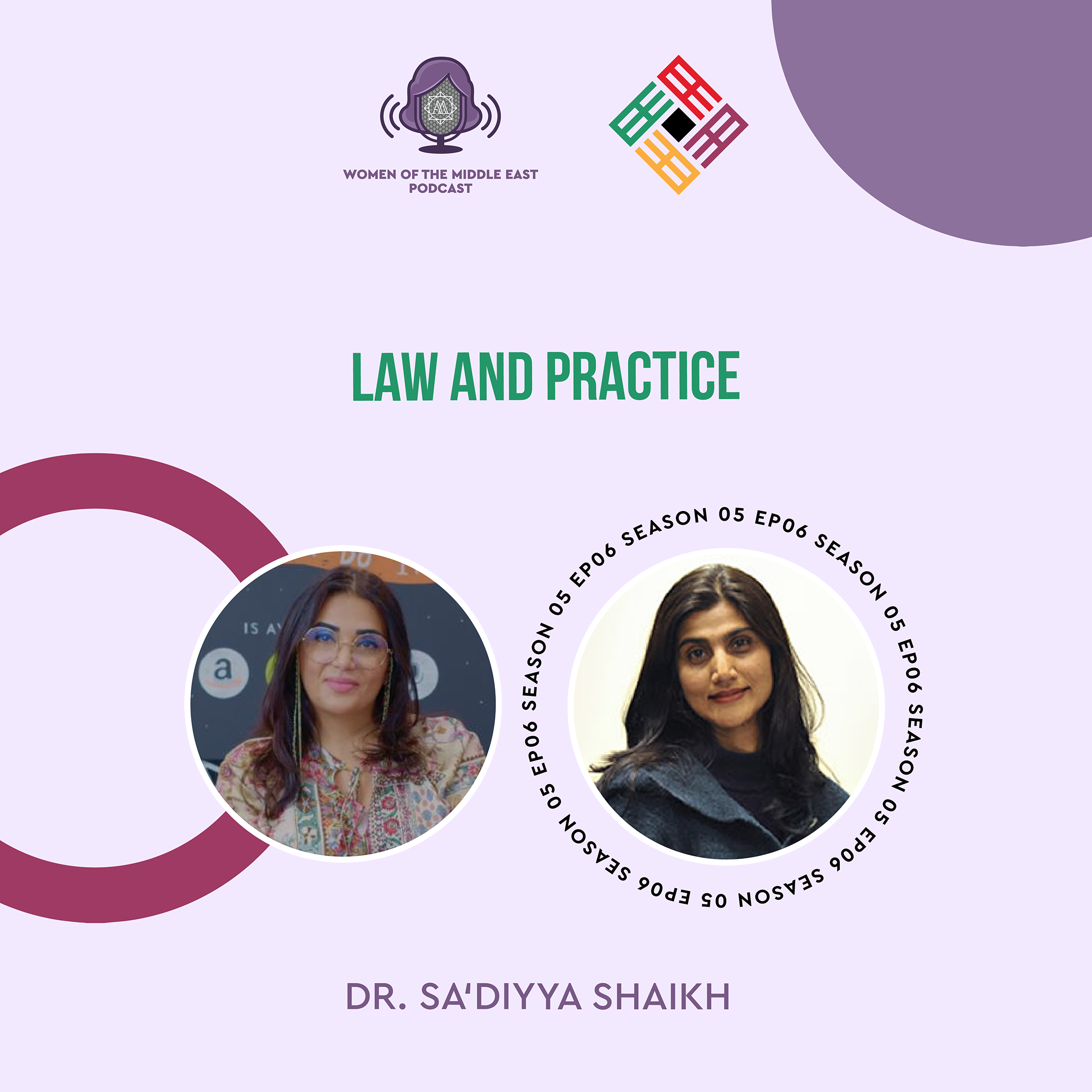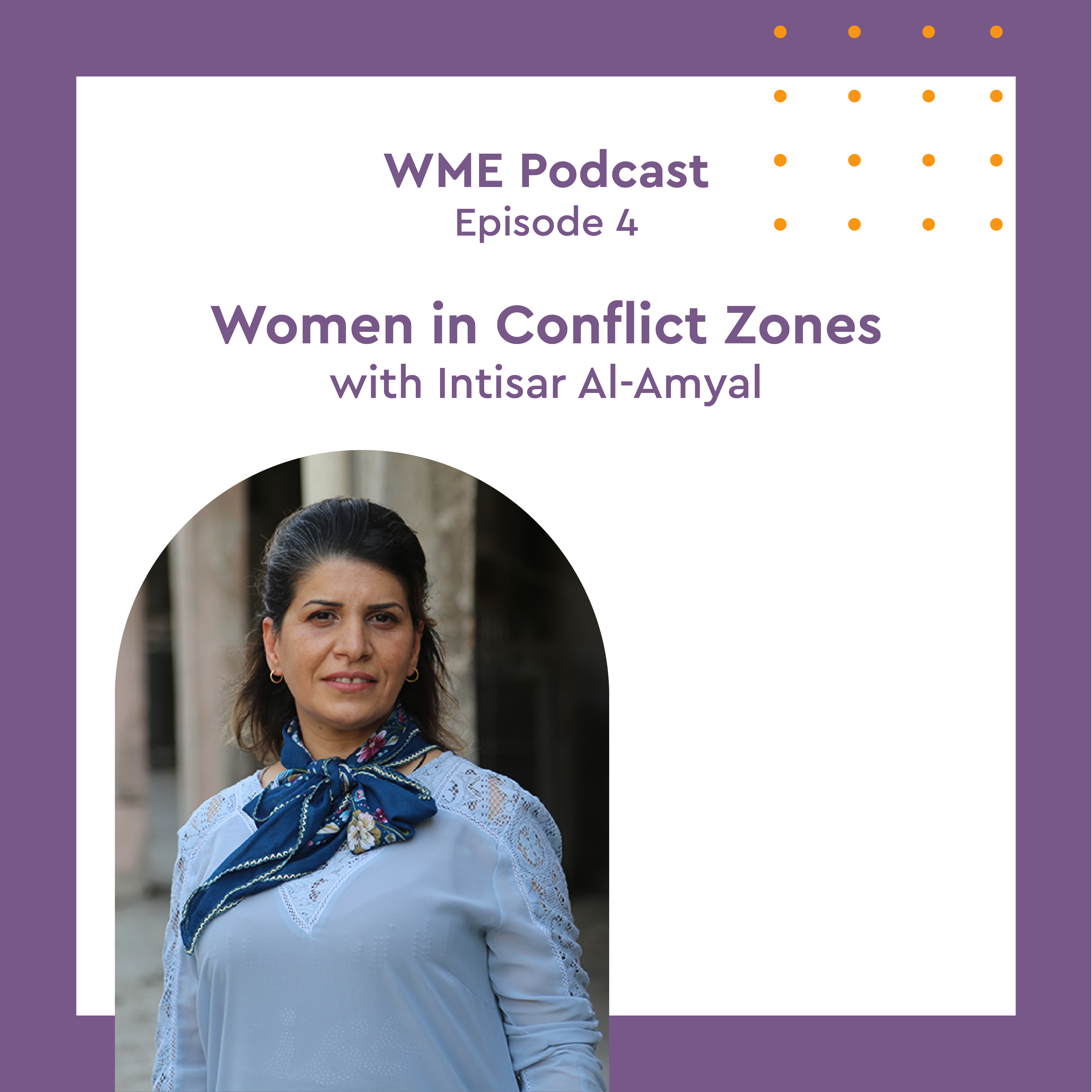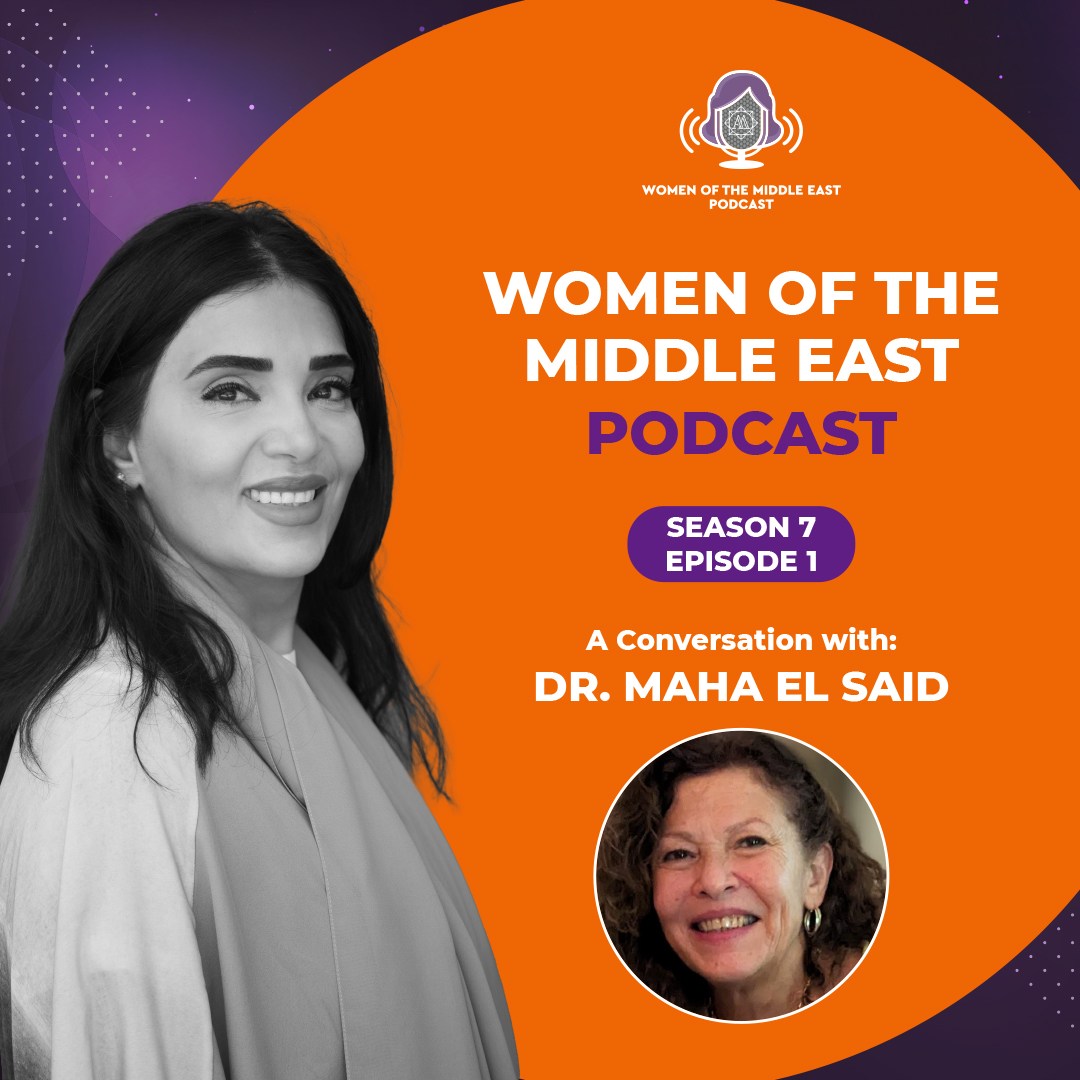Episode Transcript
Speaker 1 00:00:04 Hello and welcome to Woman of the Middle East Podcast. This podcast relates the realities of Arab woman and the rich and diverse experiences. It aims to present the multiplicity of women's voices, and it wishes to break cultural stereotypes about women of the Middle East, as well as educate and empower the younger generation of Middle Eastern women who were stripped off their historical reference and weren't necessarily raised to believe in their agency and power to create their own destiny. Um, I'm Maki. I'm a feminist scholar and educator. I'm also the author of Arab Woman in Arab News, All stereotypes and New Media. I created this podcast to be an extension and an update of the book and its main topics.
Speaker 1 00:00:53 Hello, uh, to all listeners from the different parts of the world. I got to know that many follow, uh, from Europe, from, uh, the Americas, and of course from the Middle East. Um, I have a special announcement for you, Uh, given the fact that I've been very, very lazy in, uh, posting or uploading new, uh, episodes. What I've decided is to make it up to you by, uh, posting, uh, an episode every two weeks till the end of the summer. Uh, as you know, we have been bombarded by online events this year, but I am selecting, uh, one event that is special to me and that I've actually participated in and enjoyed participating. And as you know, International Women's Day is, uh, a day of celebration should actually be 365 days of celebration. But let's, let's not go there as a speaker, I've been released.
Speaker 1 00:01:53 Point For Choice was invited to multiple events, local and international, if even local and international as classification. Make any sense anymore to the virtual, you know, the world, uh, we live in, but I mean by local and international, as those events were originated by local and international entities. One of the events I participated in is, uh, through Executive Woman who organized their first digital, uh, edition of Empower Now on March 22 and 23 this year, 2, 20 21. This forum included a collage of amazing women showcasing their expertise underneath four main topics or themes, social impact, leadership, entrepreneurship, digital transformation. And I was one of, uh, the speakers underneath Social Impact. So I've, uh, collaborated with Executive Women and in Power Now Forum to bring to you for, uh, interventions underneath the Social Impact, uh, panel. Although I'm only bringing, uh, the four interventions under, underneath Social Impact, I really encourage you to listen to the rest of the recordings underneath the rest of the schemes.
Speaker 1 00:03:16 There are really excellent, excellent speakers across these, uh, themes such as Susan Furnace, uh, Noha Heney, just to mention a few. So I encourage you also to check, uh, and learn more about Executive Woman through visiting their website, executive dash woman dot. And once we're back, uh, after summer, and I hope you all have a wonderful summer, uh, for those who are vaccinated and are able to travel, or those who are not vaccinated and are, uh, still within, um, uh, their spaces, uh, hopefully their, uh, safe spaces. After we come back, I will post a couple of, uh, very interesting interviews that already actually, and which I think you would really like because they feature young, uh, women from the Middle East, uh, tackling a couple of very interesting themes as well. Uh, one is Generation Equality and the other one is intersectional feminism. So how about we begin first intervention from the Social impact panel with, uh, mine, uh, on feminist leaders.
Speaker 2 00:04:38 And thank you for you for joining us all the way from Qatar. Thank God for technology. You has really, um, made all the borders open and, uh, enabled all of us to access this wonderful event wherever we are in the world. Dr. Emma, Mark, it's a pleasure to welcome you. You are the founding Dean of the College of Humanities and Social Sciences of, uh, TAed Khalifa University, and you are also the founder of Women of the Middle East Podcasts, and we welcome you today to speak about gender balance and how we can use the balance and building balance communities. I think it is really dear topic to my heart personally and to lot of our audience. This stage is yours.
Speaker 1 00:05:23 Thank you. Thank you, he so much. It's lovely to meet you all. I'll bite virtually, uh, hopefully we'll, uh, we'll meet, uh, one day. Um, I'm, uh, very happy to be here today as well. And, um, it's not the first time I, I, um, uh, participate in executive woman conferences, although this is the first time we do it online. Um, I enjoyed the, the talk of, uh, my colleagues, um, and, uh, Rita's talking specific to touching on feminine leadership, and I think this is where I'm gonna take it and build on it. So, uh, yes, I'm a big, I'm a true believer in, in feminine leadership and, uh, which, which I believe is an ethical leadership as well. And, um, I wanna talk more about feminist approach towards envisioning future balanced communities post Covid 19, uh, and how gender quality and gen gender justice can be key factors in creating a more resilient, more balanced communities that will not only recover from the devastating impacts of the global pandemic, but also our abilities to plan for a better future.
Speaker 1 00:06:28 Um, I believe that in adopting an intersectional feminist approach towards the future, we ensure that no one is left behind the multiple oppressive layers, uh, of injustices that women are subject to, such as, uh, you know, class, race, sexual orientation, and more are addressed. Um, this future perspective through feminist lenses isn't the only intersect, isn't only intersectional, but also inclusive. It widens the scope of what is considered women's issues in light of the reality that women's issues are human issues and thus embedding gender equality and gender justice in the overall discourse about discourse, about social justice and equality. Um, therefore, we saw the same woman who were fighting, um, against sexual harassment, for example, during the Me Too movement. Uh, so the Black Lives matter too marching, you know, um, against racism, uh, because race is also a main factor of oppression for women just like anyone else.
Speaker 1 00:07:33 Uh, we also witnessed mainstreaming feminist movement, supporting disability rights, um, fighting displacement and fighting global climate crisis, For example. For example, we've got, um, uh, Vanana Sheva. Uh, she's an equal feminist and activist from India who has published more than 20 books and has worked to raise awareness about how environment degradation impacts women. One of her famous quotes is, and I quote, We are the Earth. Uh, we are either going to have a future where women lead the way to make peace with the, with the earth, or we are not going to have a human future at all. Uh, and of course, we cannot forget Brita and bird's, uh, outcry not to hijack the future of the younger generation. Uh, feminist future also builds, um, feminist economies that take into consideration the wellbeing of children, women, and men and local and global communities. Feminist economy looks at every work as a valued type of work that contributes to the economy directly or indirectly.
Speaker 1 00:08:39 Feminist future engages with politics, right, through practices based on ethics, morality, Um, in this case, for example, feminist ethics of, of care and responsibility redefines the ethical, um, leadership. Um, and this is where, you know, I I totally agree with Rita. Uh, it redefine what ethical leadership looks like and strips it away from its dominating masculine traits. You know, I don't have to be like a man to be a good leader, right? I can still be rational and, and an empath or rational and compassionate. So a living example of this kind of leadership is, um, uh, Aron, uh, the, the Prime Minister of New Zealand, who has led with compassion, uh, empathy and honesty, and her strong leadership during covid 19 is the exemplary. Um, and, and there are more, um, in summary, this future we envision will need to redefine concepts in order to change the norms associated to these concepts needs to look at gender equality and gender justices within the social justice framework and promote balanced communities for all.
Speaker 1 00:09:46 But why, why do we need a feminist approach to the future? Is it because we're feminists and we wanna rule? Definitely not. And are we saying that realities are already gendered and imbalanced, that it needs to be, you know, looked at differently? Well take the recent global pandemic and let's focus on the gendered impact of covid 19. No doubt the pandemic had devastating effects globally, yet the weakest were hit the most and inequalities between nations as well as people were exposed and more over exacerbated. Let me focus on gender, uh, based inequalities exposed by the fragility of our systems. First of all, the first exposed point of fragility is our care system that is highly gendered. So care work, okay, is a large portion of what we women do and expect to do, right? Including domestic work, looking after children, elderly, elderly parents, sick family members or members with special needs.
Speaker 1 00:10:52 Uh, care work comes under unpaid work that is critical for the paid work to happen. This is not just just gendered, but also touches on race and class with the wealthier being able to subcontract such work to poor woman, okay? Usually from, you know, a different definitely poorer, uh, class, but also sometimes ra different racial class who won't be able, those women won't be able to take care of their own children and parents, we've heard, of course, horrific stories that emerged during Covid 19 about domestic workers who, um, who are mainly women, uh, some being belonged to racial, uh, minorities and, um, who are kicked out left alone with no money, no shelter. And it's from different parts of the world, but also from our, uh, part of the world. Um, this system of gendered care work perpetuates gender roles and creates a huge imbalance in our societies.
Speaker 1 00:11:50 A recurrent story of the pandemic is how women's work has multiplied with children being, children being at home, Um, usually some who are studying from home and some with husbands at home, and some, you know, taking care of elderly parents. Some have left their paid jobs and, and there are cases that I know personally, some have lost their source of income by being fired or, you know, lost their jobs. But others have worked, continued to work like most of us from home. And, you know, their caregiving responsibilities have doubled and tripled. So, um, I wanna, um, talk about the policy paper entitled Economic Justice and Rights, Uh, Rights Women in the Arab region that states, uh, that unpaid child, uh, uh, care work results in women spending almost five times more hours than men on unpaid care work. A 2015 study, and this is before Corona, you just can imagine, you know, how the numbers have have grown.
Speaker 1 00:12:50 Uh, the 2015 study showed that about 91% of the females in both Egypt and Palestine perform and unpaid activities such as household activities and caring for children and elderly compared to only 26% of men. And the survey notes, uh, that the domestic unpaid work burden of married women does not decrease when they join the labor, um, market. You know, they're still supposed to do both. Women and Lebanon spend an average of 60 hours per week on unpaid household related activities such as childcare, cooking, and, and cleaning. So this pandemic has shown the degree of fragility of the care work system and the need to acknowledge and address this invisible and unpaid work. We need to find ways of having it paid and divided to reflect the fact that it is the responsibility of the community as a whole and the government, you know, as well, not only woman.
Speaker 1 00:13:52 Um, Oxfam and the recent report, uh, that was published, um, end of 2020, Feminist Futures Caring for People, Caring for Justice and Rights states that we must develop a new collective voice agency leadership and practice that is compassionate and transformative. We must invest in econo economies that are inclusive and protect human rights through fairness, literality feminist coaches and sustainability. We must redefine social solidarity through budgets that prioritize health, education, peace, and apply fiscal justice for the enjoyment protection enhancement of people's rights and freedom. Second point is the breakdown of social structures, allowing for gender based violence, uh, to increase and to be called by the UN a shadow pandemic. Now, even before Covid 19, uh, one and three women were subject, subject to violence during Covid, we witnessed an increase in the numbers of cases of violence against women and the numbers of pulls to domestic violence hotlines all around the world, but also, bear in mind that many cases went, um, unreported.
Speaker 1 00:15:06 Yes. Um, but thanks to social media, okay, some of these cases were exposed, especially from our part of the world. Well, we've seen horrific, horrific stories coming from every part of the world, really. Um, Oxfam report 2020 that I refer to states that the economic insecurity, lack of mobility, uh, and perceived loss of controlled by men leads to the use of violence as a tool of free asserting power and dominance in the home. While su uh, society excuses the violence as part of domestic life in times of crisis or in times of stress, victims of abuse and violence were not able to seek or obtain help as some of the social and legal services have been interrupted during lockdowns. While this also exposed the fact that some Arab countries didn't have any services to begin with, had few or no shelters, had no hotlines, and had no medical, legal or psychological services available.
Speaker 1 00:16:08 Not to mention that what, what refugee woman must have, uh, gone through or women in conflict zones like Yemen, Syria, Iraq, and Palestine, what the gender based violence took a virtual, um, form as well. Uh, we witnessed a, an increase, uh, in, uh, online violence against women in the Arab states. Now, third and finally, I also summarize some of the points mentioned in the impact of Covid 19 on gender equality in the Arab region Report that assesses the, the, the, this proportionate impact of covid 19 on women, and gives you on the idea about other, um, fragility that women went through and the healthcare, for example, women dominate the healthcare systems in the airport as nurses, midwives, and support staff, making them more vulnerable to contracting covid. 19 women receiving limited or no sexual or reproductive services. Mental and psychological stress and pressure on women, the traditional caregiver were not mentioned and were not stressed as well. Financially, women will lose over seven, 700,000 jobs. Poverty, unemployment, unpaid labor increased, and domestic workers are left vulnerable. Other negative impact cover lack of access to internet, and therefore they were deprived from sources of communication, sources of information, and of education. Cuz education went online too. So nearly, nearly half of the female's population of 84 million is not connected to the internet, nor has access to mobile phones.
Speaker 1 00:17:50 So, um, I conclude, um, by emphasizing that we need a feminist future that is based on intersectionality, inclusiveness, and feminist ethics to build sustainable, just balanced communities. How would we do that? I think by, you know, this, this venue is a lovely one because I'm an academic. You see people from academia, feminist from academia, feminist from the business world, from a feminist, from the political world. It needs really lots of, um, um, collaboration to be done. Thank you.
Speaker 1 00:18:33 So we come to the end of this episode. I hope you enjoyed it. Um, it's worth mentioning that the moderator on the social impact, uh, panel is, uh, Hannah Binal, who is the founder of taaz, uh, founder of Lean in Arabia, and the executive director of Sustained Leadership. I'll leave you and I'll, uh, connect again in two weeks, uh, with the second intervention from the panel, and it'll be by Rita Anani from Beirut from Lebanon, and her intervention, um, is, uh, about gender-based violence. She is the founder and director of abad, Abad and Arabic, uh, which is a resource, um, organization that works on G B V, gender-based violence that matters. Uh, and I bet you'll enjoy her talk as well. Uh, until next time, stay safe and take care.


